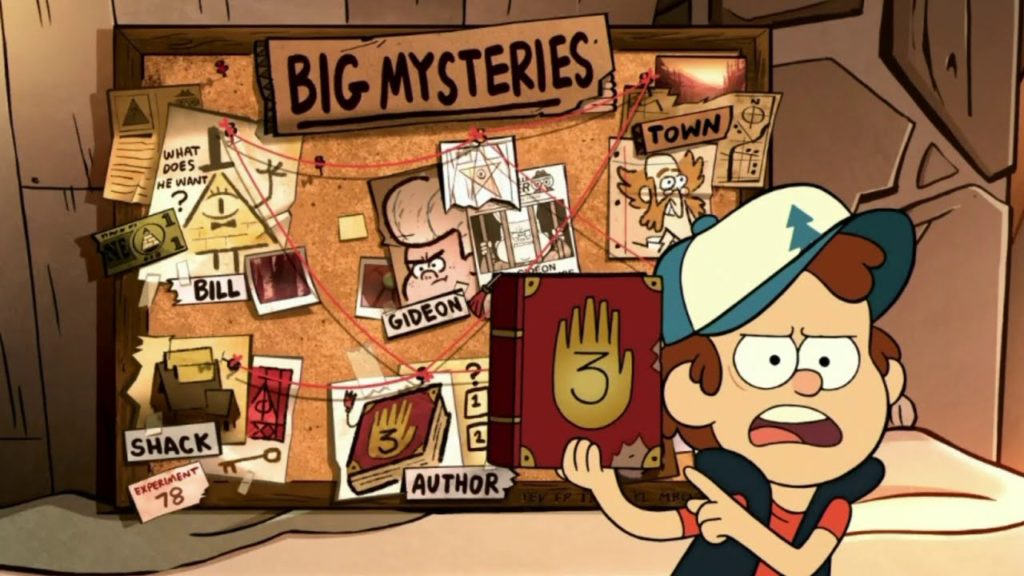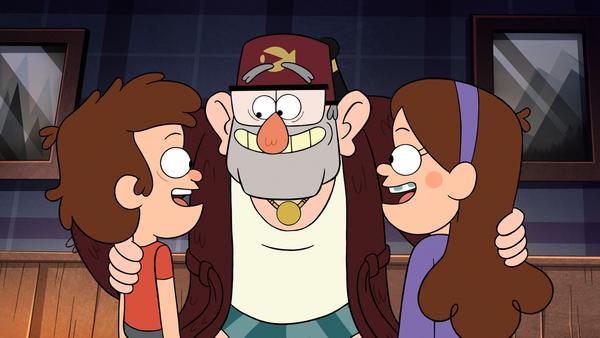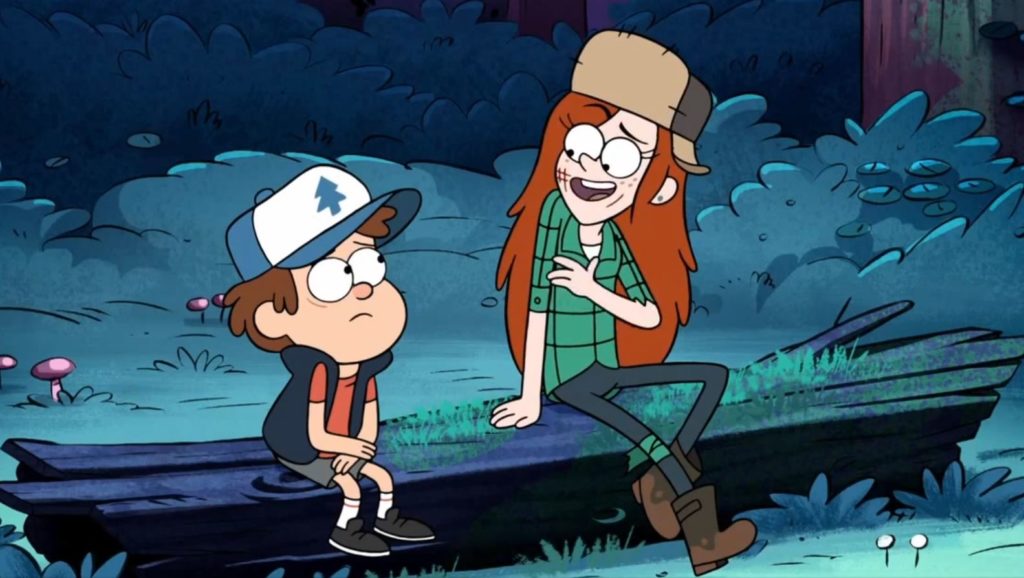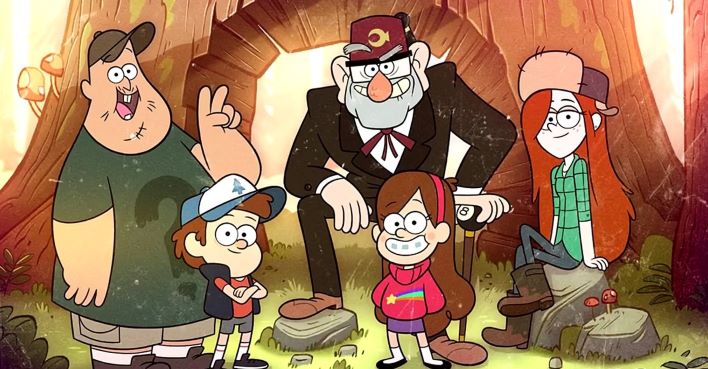“If you’ve ever taken a road trip through the Pacific Northwest, you’ve probably seen a bumper sticker for a place called Gravity Falls. It’s not on any maps and most people have never heard of it. Some people think it’s a myth. But if you’re curious, don’t wait. Take a trip. Find it. It’s out there. Somewhere in the woods. Waiting.”
Ten years ago today, a show premiered that… okay. I’m going to use a line here that is abused to the verge of meaninglessness, which is a shame because I can’t think of a more appropriate use for it. So, that said, a few minutes of your time to talk about Gravity Falls, a show that changed my life.

Like many people I didn’t catch Gravity Falls during its initial run. In their infinite ignorance it was yet another of the Disney Channel’s properties where the very idea that it could be a cultural phenomenon or the tentpole of a brand that would engage audiences of all ages for decades was lost on them. Like most original properties delegated to their secondary cable network, Gravity Falls was destined to never make as much money as Mickey Mouse, Marvel, or Star Wars, and so it was decided it wasn’t worth investing in to make any money on at all. (To this day, almost all the show’s merchandise is produced by a fan selling stuff out of his home in North Carolina, and his ticket to heaven is already punched for it). A decade later, the show endures for two very specific reasons: the miracle of easier access on streaming networks, and the fact that it’s simply minute-for-minute the greatest television show ever produced.

For the uninitiated, the quickest primer I can muster: Gravity Falls depicts over a criminally short two seasons—just 40 22-minute episodes total—the unexpected adventures of twins Dipper and Mabel Pines, sent to spend the summer, and upcoming 13th birthdays, at a run-down tourist trap owned by their great-Uncle Stan in the titular, quintessential middle-of-nowhere town in Oregon. Its writing and humor remain unparalleled a decade later. Hijinks ensue and gnomes vomit rainbows. Mysteries seem to—no pun intended—gravitate toward this weird little town, almost methodically providing, shall we say, a monster every week.
But less than five minutes into the first episode, the show drops any pretense of being an episodic, premise-based cartoon sitcom to distract the kids while you’re paying the water bill and makes it very clear you will be in this for the long haul. Secret codes appear in the end credits. Strange-looking characters in the background wait to explain themselves a few episodes later. A strange noise in the opening titles piques your curiosity, and maybe if you’re extra smart, it only takes half the season before you realize the noise is different each time and sounds like it’s being played backwards. A single frame flashes the show’s monstrous antagonist—I can’t fathom the anguish felt by fans of the show during the original run who had to wait three years to meet him. I first watched the show on Hulu years later and was able to binge it. I am one of the privileged.
Moving past the introduction, it’s hard to analyze the show without spoiling it. This obligates me to be very vague moving forward, so if you haven’t seen it, I must hold the hope that you trust me enough to know I’m not over-hyping it and will take my advice to watch it soon. And I guess it’s funny I said that, because it reflects on why I don’t just talk about this show for being good, but for being important. Motivated by its countless clues and hidden puzzles, Gravity Falls isn’t just a show meant to be enjoyed; it’s a show deserving of your time to be thoroughly studied.
“Kid plucked from their normal environment grows and learns through unexpected but magical experiences” is family programming’s mother sauce. There’s no point in saying that a show meant for a family audience on a family channel is “about family.” The distinction in all these shows is the theme of those experiences, either embracing it if it’s positive or fighting it if it’s negative. It’s that one thing that makes each show so unique, and when applied properly, so important. Steven Universe is fundamentally a show about identity. She-Ra is about neglect. DuckTales is about belonging. The Owl House is about conformity.
Especially in the world today, there’s something very important that we often deprive from ourselves, especially children, despite it being a resource we can offer freely and infinitely. Gravity Falls is a show about trust.
Through every plotline, major or minor, the development of the citizens of Gravity Falls is rooted in trust. Characters’ biggest fears are the unknown, their biggest regrets are moments of betrayal, and their greatest moments of growth are when they learn to trust one another. All throughout the show various mysteries are obscured by the citizenry of a suspicious town, but when the ultimate villain is revealed as essentially a sentient avatar of deceit, the town defeats it by, quite literally, coming together. (Like many millennials I am wont to misuse the word “literally.” I am not doing so here, and I will say nothing else, because explaining that last sentence further would betray the two-season payoff you would get from just watching.) Both grand and minute, the villains of Gravity Falls deploy lies as their chief weapons, and at every turn, the greatest hinderances our heroes face are when they lie to each other… or to themselves.
If there is any great criticism to be made of Gravity Falls in 2022, it is one that is not as much creator Alex Hirsch’s fault, but as often is the case, the meddling of Big Mouse. We have so much to improve upon as a society, and ten years ago we had far more. Gravity Falls is, by corporate edict, a frustratingly heteronormative show. Hirsch is long on record about Disney’s direct orders to remove queer characters and plotlines from the series. And yet, forced to address coming-of-age and personal growth in a strictly cisgendered tone, Hirsch and his team turned the trope on its head in a manner rarely, if ever, addressed over the course of an entire Disney series. While the blatant lack of diversity doesn’t hold up ten years later, Gravity Falls’ recurring and direct addressing of manhood and toxic masculinity does. And on that, it shines.
Dipper, a 12-year-old boy and the show’s main character, doesn’t just go through puberty in the show but openly addresses his pain (and hopes, if you’ll call it that) through it. Entire episodes are devoted to Dipper’s frustrations and fears about the concept of manhood, to a degree that many fans present a valid case that the character’s struggles with his own identity and cultural norms are queer- or trans-coded. He is a child who desperately wants to grow up, believing it to be an automatic solution, paired with a twin sister who fears leaving childhood behind. The moment that the two realize they are both lying to themselves about how easy either of those options are is among the most pivotal moments of the series.
But, of course, none of the show’s reflections on adulthood and respective emotional struggles are as blatant as Dipper’s running crush over the course of the series for Wendy, a character who, in the typical Disney female love interest fashion, is strategically designed for you to love just as much as Dipper. She’s cool and approachable! She can hang with the fellas! She’s a redhead! The main character likes her, and we like him, so clearly he deserves her! And it is here in this grand and glorious ongoing B-plot that the true genius of Gravity Falls reveals itself. This is a story, from Disney, the company that founded an empire on true love and healing kisses and princes winning their princesses, about how painfully obvious it is that this simply isn’t going to happen. And this is where one of the most important lessons you could teach kids comes into play, that being why it isn’t going to happen: because duh.

I said I don’t plan to spoil anything but I don’t consider it a spoiler if it’s obvious. Dipper’s crush on Wendy—who I should note is 15, obviously sees nothing romantic in a 12-year-old, and, let’s just roll with the fandom here, is almost certainly going to figure out she’s not into guys by college—is played consistently for what it is: not an unrequited romance to elicit sympathy for the male hero we’re supposed to assume is entitled to the girl as a prize, but as a child not understanding why it’s bad that he has a crush on his babysitter. From the perspective of a cis male, what makes this so important for a show largely geared toward young boys is how Dipper and Wendy’s relationship grows and ultimately resolves. It’s valuable enough that Dipper doesn’t get the girl and the show correctly shows why every step of the way. The capstone on all this is how, rightfully, at no point in the show is any of the conflict depicted as Wendy’s fault: because, and I truly cannot stress this enough, it’s not. And yet, Hirsch (along with Jason Ritter’s and Linda Cardellini’s masterful voice acting) crafts a way for two people, who while at such different stages in their burgeoning adulthood are both still very much children, to talk to each other about what they mean to each other like adults. It is one of the greatest acts of respect I have seen a show give to its audience, to young women, and to the trust it offers to young boys to learn from it.
It is summed up masterfully in a single throwaway line from Dipper, which I consider the single best quote of the entire show: “If I’ve learned anything this summer, it’s that you can’t force someone to love you. The best you can do is strive to be someone worthy of loving.”
While heartbreaking to watch it go, Gravity Falls ends in a way that toes a difficult line between conclusive and ambiguous. While giving the story a definite conclusion and very clear optimism for how these people will continue on in their lives, there is no “ten/twenty years later” flash forward, no 80’s style freeze frame of what everyone went on to do, no slow shot of a door closing forever. Subscribing to the fan theory that all of the show took place over three months in 2012, Mabel and Dipper would be 23 today, and what they became as adults remains completely unrestricted to the audience’s imagination. They, like you, could become anything. The choice, as it is for yourself, is yours.
As I said about the more recent conclusion to 2019’s Amphibia, another brilliant cartoon helmed by Gravity Falls alumni Matt Braly, the bravest and most powerful thing a storyteller can do is let the story end. Alex Hirsch very specifically wanted to tell a story about a singular period in its characters’ lives, and leave all other doors open—not for a return or a third season, which Hirsch has also adamantly and bravely insisted will never happen and after ten years I think it’s time for us to accept that—but rather as a final act of trust, to simply trust the audience in letting any of their beliefs for the characters’ fates be plausible. In this, like so many other narrative risks, Gravity Falls sticks the landing.
I hold no shame is saying that when I first watched the ending of Gravity Falls, well into my 30’s, I cried—not just while watching, but for actual days afterward. In a bizarre way, part of that emotion wasn’t coming from joy or love for a show I still consider my favorite show ever, but strangely, anger. I felt an anger, at no fault of the show’s creators, akin to the anger I imagine a 30-year-old would feel if they were suddenly reunited with a parent who walked out on them as a child. A voice inside me wanted to scream, near-incoherently, at the nonexistent physical manifestation of a children’s cartoon show: “where the hell were you twenty years ago when I needed you?”
I am a person who only in the recent past few years has been willing to be more open about themselves emotionally—as a person who struggles with depression, and as a person who struggles deeply with self-worth. A significant part of this healing process involves reflecting on the person I was as a teenager and through my 20’s, and for anything I may say now, in my 40’s, about how I hated myself, I hated that person much, much more. I said (god help me) 1,800 words ago how Gravity Falls changed my life; the irony here is the strongest way it changed me was how it forced me to think about how long, far too long, I waited to change.
I have only recently in my life acknowledged that I don’t like myself, and until I address that, expecting others to like me is at best an uphill climb and at worst a direct challenge. And I wish, oh how I wish, I could have figured that out in high school, instead of expecting love like an entitlement, instead of assuming I was owed more friendship than I was willing to offer, instead of seeing relationships as a commodity where if I didn’t get exactly what I wanted then the transaction was worthless.
At the risk of making such a downer of celebrating a gloriously heartwarming cartoon (as well as worrying my loved ones), I want to be clear here that I’m in a much better place than I was a few years ago, but we all still have work to do. But I wish that inspiration had existed earlier. For the next generation, it does.
My greatest hope, on this tenth birthday of such an extraordinary achievement as Gravity Falls, is that I can inspire you to experience it for yourself. Maybe its lessons will rub off on you much earlier in your life than it was able to for mine. Maybe you’ll find a completely different lesson deep in its rich and detailed story. Maybe your kids will just find the pig adorable. In any case, it remains a masterpiece of a show, that among so many other things said one of the greatest pieces of advice directly to me: strive to be someone worthy of loving. Thank you, Alex Hirsch, for creating a show that did just that.
Happy ten years, Gravity Falls. See you next summer.

All images © Disney
